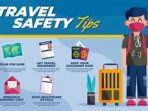
Essential Travel Health and Safety Tips for International Trips
Embarking on an international trip is an exciting adventure, filled with the promise of new experiences and unforgettable memories. However, it’s crucial to prioritize your health and safety while exploring varied cultures and landscapes. This thorough guide will equip you with essential travel health and safety tips to ensure a smooth and enjoyable journey.
Preparing Your Body for the Journey:
Before you even pack your bags, it’s vital to ensure your body is ready for the rigors of international travel. This involves taking proactive steps to prevent health issues and minimize travel fatigue.
1. Vaccinations and Immunizations:
International travel often exposes you to diseases that may not be prevalent in your home country. Consulting your doctor well in advance of your trip is crucial. They can advise you on necessary vaccinations and immunizations based on your destination and your personal health history. Some common vaccinations recommended for international travel include:
- Hepatitis A and B: These vaccines protect against liver infections prevalent in many parts of the world.
- Typhoid: This vaccine guards against a bacterial infection spread through contaminated food and water.
- Yellow Fever: Required for travel to certain countries in Africa and South America.
- Rabies: Particularly crucial if you strategy to engage in activities involving close contact with animals.
- Meningococcal: Protects against bacterial meningitis, a serious infection of the brain and spinal cord.
Remember to allow sufficient time for your body to build immunity after receiving vaccinations.
2. General Healthcare and Medications:
Ensure you have a basic travel first-aid kit, including essential medications for common ailments like:
- Antibiotics: For treating bacterial infections.
- Antihistamines: For managing allergies and insect bites.
- Pain relievers: For headaches and muscle aches.
- Motion sickness medication: For those susceptible to motion sickness.
- Diarrhea medication: For treating digestive issues.
3. Addressing Jet Lag:
Jet lag, a disruption of your body’s natural sleep-wake cycle, can make your first few days in a new location feel disorienting. To minimize its influence:
- Adjust your sleep schedule gradually: Start adjusting your sleep patterns a few days before your trip by going to bed and waking up earlier or later, depending on your destination’s time zone.
- Avoid caffeine and alcohol: These substances can disrupt your sleep cycle.
- Expose yourself to sunlight: Sunlight helps reset your internal clock.
- Drink plenty of water: Staying hydrated is vital during travel.
4. Managing Diet and Hydration:
Traveling often means indulging in new cuisines, but it’s essential to maintain a balanced diet.
- Stay hydrated: Drink plenty of water, especially if you’re in a hot climate. Avoid tap water in areas with queryable water quality.
- Eat at reputable restaurants: Stick to well-established eateries and avoid street food in areas where hygiene standards are unknown.
- Be cautious of unfamiliar foods: Start with smaller portions of new foods to avoid unexpected reactions.
5. Adapting to a New Climate:
Adjusting to a varied climate can take time.
- Wear appropriate clothing: Pack light, breathable clothing for hot climates and layers for cooler temperatures.
- Protect yourself from the sun: Use sunscreen with a high SPF, wear a hat, and avoid prolonged exposure to direct sunlight.
- Stay hydrated: Drink plenty of fluids to prevent dehydration, especially in hot weather.
Understanding Health Risks at Your Destination:
Every destination presents its unique set of health risks, so investigateing potential dangers is essential.
1. Infectious Diseases:
- Mosquito-borne diseases: Malaria, dengue fever, Zika virus, and yellow fever are common in tropical regions. Consult your doctor about preventive assesss like mosquito repellents and antimalarial medications.
- Waterborne diseases: Typhoid, cholera, and hepatitis A are spread through contaminated water. Always drink bottled water or purified water, and be cautious about consuming raw fruits and vegetables.
- Foodborne illnesses: Eating street food or food from unhygienic establishments can lead to food poisoning. Choose reputable restaurants and ensure food is cooked thoroughly.
2. Environmental Health Issues:
- Air pollution: Air pollution levels can vary significantly between locations. Use face masks or avoid areas with heavy traffic in cities with high pollution.
- Altitude sickness: Traveling to high altitudes can trigger altitude sickness. Acclimatize gradually and consult your doctor if you experience symptoms like headaches, nautilizea, or shortness of breath.
- Water quality: Water quality can be a concern in some areas. Always drink bottled water or purify water before drinking it.
3. Dangerous Animals:
- Mosquitoes: Mosquitos can carry diseases like malaria, dengue fever, and Zika virus. Use mosquito repellents and wear long clothing at dusk and dawn, when mosquitoes are most active.
- Ticks: Ticks can carry Lyme disease and other infections. Check for ticks regularly, especially after spending time outdoors.
- Venomous animals: Snakes, spiders, and scorpions are found in various regions. Avoid contact with wildlife and seek immediate medical attention if bitten.
4. Other Location-Specific Risks:
- High UV radiation: Locations close to the equator have high UV radiation levels. Protect your skin with sunscreen and wear protective clothing.
- Natural disasters: Be aware of potential natural disasters in your destination, such as earthquakes, volcanic eruptions, floods, and hurricanes. Check local weather forecasts and stay informed about emergency procedures.
- Political instability: Research the political climate of your destination and avoid areas with ongoing conflict or unrest.
Maintaining Personal Safety:
While travel should be an enjoyable experience, it’s essential to be aware of potential safety threats and take precautions to minimize risks.
1. Crime and Theft:
- Be aware of your surroundings: Pay attention to your surroundings and avoid walking alone at night in unfamiliar areas.
- Keep valuables secure: Do not carry large amounts of cash or leave valuable items unattended.
- Use safe transportation: Choose reputable taxis or ride-sharing services, and avoid hitchhiking.
- Protect your belongings: Use a money belt, secure your bags with locks, and avoid displaying expensive jewelry or electronics.
2. Scams and Fraud:
- Be cautious of stscopers: Beware of people offering unsolicited help or advice, especially if they seem overly friendly or pushy.
- Verify information: Double-check prices and deals before agreeing to anything.
- Use reputable exchange bureaus: Beware of counterfeit money, and utilize authorized exchange bureaus.
- Protect your credit cards: Keep your credit card details secure and report any suspicious activity immediately.
3. Protecting Yourself from Assault and Violence:
- Stay in well-lit and populated areas: Avoid walking alone in dark or isolated areas, especially at night.
- Trust your instincts: If you feel unsafe, remove yourself from the situation.
- Learn basic self-defense: Consider taking a self-defense class to feel more confident in managing potential threats.
- Be mindful of your alcohol consumption: Drinking too much alcohol can impair your judgment and make you more vulnerable.
4. Managing Risk in Unsafe Areas:
- Research potential dangers: Before traveling to any area known for its safety concerns, investigate the risks and learn about safe practices.
- Stay informed about local news: Monitor local news and social media for updates on security situations.
- Avoid risky activities: Avoid traveling to areas with high crime rates or political instability.
- Be cautious of crowds: Large crowds can be chaotic and present opportunities for theft or violence.
5. Protecting Privacy and Personal Information:
- Use strong passwords: Use strong passwords for all your online accounts, including banking and travel booking platforms.
- Be careful about what you share online: Avoid sharing personal information on social media, such as your travel strategys or home address.
- Use secure Wi-Fi connects: Avoid using public Wi-Fi connects for sensitive transactions or accessing personal accounts.
- Be wary of phishing scams: Be cautious of emails or websites that ask for personal information or financial details.
Preparing Documents and Information:
Before you set off on your adventure, ensure you have all the necessary documents and information in order.
1. Passport and Visas:
- Check passport validity: Your passport must be valid for at least six months beyond your strategyned return date.
- Apply for visas: Many countries require visas for entry. Check visa requirements for your destination and implement well in advance.
- Keep passport safe: Carry your passport securely and make copies of essential pages, including the photo page and visa stamps.
2. Travel Insurance:
- Choose thorough coverage: Travel insurance protects you against unexpected events such as medical emergencies, flight cancellations, lost luggage, and theft.
- Consider additional coverage: Additional coverage options may include:
- Medical evacuation: Covers the cost of transporting you back to your home country in case of a serious medical emergency.
- Emergency medical expenses: Covers the cost of medical treatment in the event of an illness or injury.
- Trip cancellation or interruption: Provides reimbursement if you have to cancel or interrupt your trip due to unforeseen circumstances.
3. Emergency Contact Information:
- Keep emergency contacts handy: Make sure you have easy access to the contact details of your family, friends, and your embassy or consulate in your destination country.
- Share travel itinerary: Share your travel itinerary with someone you trust, including your flight details, accommodation bookings, and strategyned activities.
4. Travel Plans and Schedules:
- Plan your itinerary: Create a detailed itinerary, including flight and accommodation bookings, strategyned activities, and transportation details.
- Make copies of crucial documents: Make copies of your passport, visa, travel insurance policy, flight tickets, and accommodation confirmations.
- Download travel apps: Use travel apps to manage bookings, monitor flights, and find local information.
5. Currency Conversion:
- Research exchange rates: Research current exchange rates for your destination currency.
- Exchange money wisely: Avoid exchanging money at airports or tourist traps, as exchange rates are often less favorable.
- Use multiple payment methods: Carry a mix of cash, credit cards, and debit cards to ensure you have options available.
Communication and Emergency Communication:
Staying connected is crucial during international travel, especially in emergencies.
1. Learning Local Language:
- Learn basic phrases: Even a few basic phrases in the local language can go a long way in making your interactions more comfortable and enjoyable.
- Use translation apps: Download translation apps to assist you with communication, especially if you encounter language barriers.
2. Downloading Translation Apps:
- Utilize translation apps: Translation apps like Google Translate and Microsoft Translator can be invaluable for communicating with locals.
- Consider offline translation: Some apps offer offline translation capabilities, which are helpful in areas with limited internet access.
3. Establishing Emergency Contacts:
- Save emergency numbers: Save crucial phone numbers, including your embassy or consulate, local emergency services, and trusted family and friends.
- Notify contacts of your travel strategys: Inform your family or friends about your travel strategys and itinerary.
4. Understanding Emergency Protocols:
- Research emergency procedures: Familiarize yourself with emergency procedures in your destination country, including how to call for help, report incidents, and seek medical assistance.
- Know the local emergency number: Remember the local emergency number (e.g., 911 in the US, 999 in the UK).
5. Utilizing Local Communication Services:
- Purchase a local SIM card: A local SIM card can offer affordable data and calls, making it easier to stay connected.
- Use international calling apps: Apps like WhatsApp, Viber, and Skype offer international calling at lower costs than traditional mobile strategys.
Choosing Safe Accommodation:
Finding safe and comfortable accommodation is essential for a pleasant travel experience.
1. Selecting Reputable Hotels or Accommodations:
- Read reviews: Read reviews from other travelers before booking your accommodation. Look for recommendations on safety, cleanliness, and customer service.
- Check security attributes: Choose hotels with security attributes like key card entry, security cameras, and 24-hour reception.
2. Reviesucceedg Security and Facilities:
- Inspect rooms for safety: Check the room for any safety hazards, such as loose wires, broken furniture, or faulty electrical outlets.
- Evaluate location: Consider the location of your accommodation in relation to transportation, attractions, and safety.
- Ask about security assesss: Inquire about the hotel’s security assesss, such as security guards, safety protocols, and emergency procedures.
3. Securing Valuables:
- Use hotel safe: Utilize the hotel safe to secure valuable items such as jewelry, passports, and electronics.
- Keep valuables out of sight: Do not leave valuable items visible in your room.
- Be cautious of your belongings: Keep your belongings secure at all times, especially in public areas.
4. Being Mindful of Surroundings:
- Be aware of your surroundings: Pay attention to who is around you, especially when entering and exiting your accommodation.
- Trust your instincts: If you feel unsafe, report your concerns to hotel staff or local authorities.
5. Utilizing Recommended Accommodations:
- Use trusted booking platforms: Book your accommodation through reputable platforms like Booking.com, Expedia, or Airbnb.
- Consider recommendations: Seek recommendations from friends, family, or fellow travelers who have stayed at reputable accommodations in your destination.
Managing Finances Wisely:
Managing finances responsibly while traveling is crucial to avoid unexpected expenses and financial difficulties.
1. Carrying Enough Cash:
- Estimate your expenses: Estimate your daily expenses for food, transportation, activities, and souvenirs.
- Carry enough cash: Carry enough cash for your immediate needs, but avoid carrying large amounts.
2. Using Credit Cards Wisely:
- Inform your bank about your travel strategys: Notify your bank about your travel dates and destinations to prevent your cards from being blocked.
- Use credit cards for major purchases: Use credit cards for significant expenses like accommodation, flights, and rental cars.
- Monitor your transactions: Check your credit card statements regularly to ensure all transactions are valid.
3. Exchanging Currency Wisely:
- Compare exchange rates: Compare exchange rates at varied banks, exchange bureaus, and ATMs before exchanging money.
- Use ATMs for small withdrawals: Withdraw small amounts of cash from ATMs as needed to avoid carrying large amounts of cash.
- Avoid using airport exchange bureaus: Airport exchange bureaus often have less favorable exchange rates.
4. Preventing Theft and Loss of Money:
- Keep cash secure: Use a money belt or secure wallet to keep your cash safe.
- Spread out your money: Do not carry all your money in one place.
- Protect your credit cards: Keep your credit cards secure and report any lost or stolen cards immediately.
5. Utilizing International Banking Services:
- Open a travel-friendly bank account: Consider opening a bank account with a bank that offers low international transaction fees.
- Use a presubscription-based travel card: Presubscription-based travel cards can offer a safe and convenient way to manage your finances while traveling.
Managing Stress and Fear:
Traveling to unfamiliar places can be overwhelming. It’s essential to manage stress and anxiety to ensure a safe and enjoyable trip.
1. Managing Travel Anxiety:
- Prepare well in advance: Thorough strategyning and preparation can minimize anxiety by giving you a sense of control.
- Practice relaxation techniques: Learn and practice relaxation techniques like deep breathing, meditation, or yoga to manage stress.
- Talk to your doctor: If anxiety is severe, consult your doctor to discuss potential treatments or rencanaes.
2. Building Confidence:
- Research your destination: Learn about the culture, customs, and safety precautions of your destination.
- Connect with other travelers: Connect with other travelers online or through travel forums to get advice and reassurance.
- Remember your travel objectives: Focus on the reasons you’re traveling and the experiences you’re looking forward to.
3. Maintaining Mental Wellness During Travel:
- Get enough sleep: Make sure you get enough sleep to avoid feeling tired and overwhelmed.
- Eat healthy foods: Eating healthy foods will offer you with the energy you need to explore and enjoy your trip.
- Take breaks: Don’t try to cram too much into each day. Schedule some time for relaxation and downtime.
4. Seeking Help if Needed:
- Contact your embassy or consulate: If you experience a personal emergency, contact your local embassy or consulate for assistance.
- Reach out to your travel insurance offerr: Your travel insurance offerr can offer back and resources in case of unforeseen events.
- Seek medical attention if necessary: Don’t hesitate to seek medical attention if you experience any health issues.
5. Enjoying Your Trip with a Relaxed Mindset:
- Focus on the positive facets: Embrace the new experiences and cultures you encounter.
- Be flexible: Be prepared for unexpected situations and adapt to changes in your itinerary.
- Remember to have fun: Focus on enjoying your journey and creating lasting memories.
Preparing for Unexpected Travel Situations:
Even the optimal-laid travel strategys can encounter unexpected situations. Being prepared for these scenarios can help you navigate them calmly and efficiently.
1. Handling Flight Delays or Cancellations:
- Check for updates: Monitor your flight status through airline websites or apps.
- Be patient and flexible: Flight delays and cancellations are sometimes unavoidable. Remain calm and be prepared to adjust your strategys.
- Contact your airline or travel agent: If your flight is delayed or canceled, contact your airline or travel agent for assistance.
2. Facing Natural Disasters:
- Stay informed: Monitor local news and weather forecasts for warnings and updates.
- Follow safety instructions: Follow instructions from local authorities and stay aware of emergency evacuation routes.
- Have an emergency strategy: Create an emergency strategy with your travel companions that outlines how to contact each other and meet up in case of separation.
3. Dealing with Lost or Stolen Items:
- Report the loss or theft: Report the loss or theft to local authorities and your travel insurance offerr.
- Keep documentation: Maintain records of your lost or stolen items, including descriptions, serial numbers, and purchase receipts.
- Contact your embassy or consulate: Your embassy or consulate can offer assistance in replacing lost or stolen documents.
4. Seeking Assistance and Emergency Services:
- Know local emergency numbers: Remember the local emergency number (e.g., 911 in the US, 999 in the UK).
- Carry your insurance information: Keep your travel insurance details readily available.
- Communicate clearly: If you need help, communicate clearly and calmly with local authorities or emergency services.
5. Managing Emergency Situations:
- Stay calm and rational: In an emergency situation, remain calm and assess the situation clearly.
- Prioritize safety: Put your safety first and make decisions that minimize risk.
- Follow instructions: Listen to instructions from local authorities or emergency personnel.
Being a Responsible Traveler:
Responsible travel involves being mindful of your influence on the environment, local communities, and cultural heritage.
1. Respecting Local Cultures:
- Research cultural norms: Learn about the local customs and etiquette to avoid cultural faux pas.
- Dress appropriately: Respect local dress codes and traditions.
- Be respectful of religious sites: Follow rules and regulations at religious sites and dress modestly.
2. Maintaining Cleanliness and the Environment:
- Reduce your waste: Minimize your utilize of plastic bags, bottles, and single-utilize items.
- Dispose of trash responsibly: Use designated trash bins and avoid littering.
- Conserve water and energy: Be mindful of your water and energy consumption in hotels and other accommodations.
3. Supporting the Local Economy:
- Shop at local industrys: Support local businesses and artisans by purchasing souvenirs and crafts.
- Try local cuisine: Indulge in local delicacies and back local restaurants.
4. Protecting Local Safety and Health:
- Avoid engaging in risky activities: Be cautious of activities that could put you or local communities at risk.
- Follow health instructions: Respect local health regulations and precautions.
5. Exhibiting Polite and Respectful Behavior:
- Be respectful of locals: Treat locals with courtesy and comprehending.
- Be mindful of noise levels: Avoid being loud or disruptive in public spaces.
- Be patient and comprehending: Remember that communication can be caspeklenging, and be patient with language barriers or cultural differences.
Frequently Asked Questions (FAQ)
1. How can I stay healthy while traveling?
- Prioritize vaccinations and immunizations based on your destination.
- Carry a travel first-aid kit with essential medications.
- Drink plenty of water and avoid consuming food from queryable sources.
- Be aware of potential health risks at your destination and take necessary precautions.
2. What safety assesss should I take while traveling internationally?
- Be aware of your surroundings and avoid walking alone at night in unfamiliar areas.
- Secure your valuables and keep them out of sight.
- Use reputable transportation and avoid hitchhiking.
- Research potential safety risks at your destination and take necessary precautions.
3. How do I prepare for unexpected travel situations?
- Monitor your flight status and be prepared for delays or cancellations.
- Stay informed about local weather forecasts and potential natural disasters.
- Have an emergency strategy in place for lost or stolen items.
- Know how to contact local emergency services and your embassy or consulate.
4. How can I be a responsible traveler?
- Respect local cultures, customs, and etiquette.
- Maintain cleanliness and protect the environment.
- Support the local economy by purchasing local goods and services.
- Protect local safety and health by avoiding risky activities and follosucceedg health instructions.
5. What are some essential travel apps?
- Google Maps: For navigation and finding nearby attractions, restaurants, and services.
- Google Translate: For language translation.
- TripAdvisor: For investigateing travel destinations, attractions, and accommodation.
- Booking.com, Expedia, Airbnb: For booking accommodations.
- Currency Converter: For converting currencies and monitoring exchange rates.
Remember, responsible travel is not just about safety but also about minimizing your influence on the environment and local communities. By follosucceedg these travel health and safety tips, you can ensure a fulfilling and memorable journey while prioritizing your well-being and respecting the places you visit.





